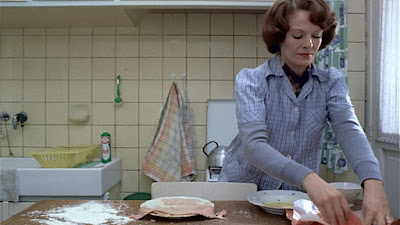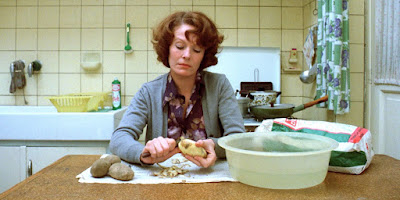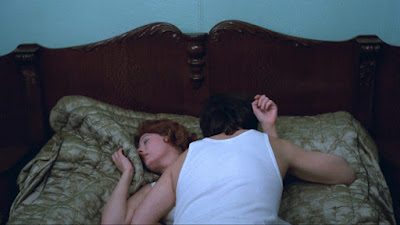I held your hand and I sighed
Is this the start of another heart break?
Or something better beginning?
This is the first 2 or 3 lines post of the new year, which is going to be full of change for me.
I’m hoping that today marks something better beginning for me. But when you make a big change in your life, you never know how it will turn out.
As the old Russian proverb says, “Maybe rain, maybe snow – maybe yes, maybe no.”
* * * * *
It is simply inconceivable to me that anyone who loves movies would say that Jeanne Dielman, 23 Quai du Commerce, 1080 Bruxelles – a 1975 film directed by the late Chantal Akerman when she was only 25 years old – was the greatest film of all time. But that’s exactly what 1639 film critics, programmers, curators, archivists and academics recently did when they voted it to the #1 spot on the British Film Institute’s “100 Greatest Films of All Time” list.
I don’t mind that the movie is slow-paced and almost entirely devoid of action. I became interested in Jeanne and her life, as mundane and banal as it seemed. (I think people are inherently interesting – even people who are unremarkable and “lead lives of quiet desperation,” to quote Thoreau.)
And I give credit to the director for coming up with the idea of making a very long movie showing a woman going through her daily routine in what often feels like real time.
But Jeanne Dielman is better characterized as a concept for a movie rather than a movie. It eschews so many of the creative elements that come together to make a movie a great movie.
There are no camera movements – the camera is entirely stationary throughout the course of a shot – and the editing is rudimentary at best. There’s no music in the movie, and virtually no dialogue – I’m guessing that you could fit all the lines uttered by the actors in Jeanne Dielman on ten pages.
 |
| Jeanne Dielman preparing veal cutlets |
Click here to watch a four-and-a-half-minute scene of the movie’s titular character preparing veal cutlets for dinner. It’s quite representative of the movie as a whole: there are no words or music . . . no camera movement or editing . . . just four and a half minutes of a middle-aged woman prepping veal cutlets.
* * * * *
As I pointed out in the previous post, the first of the three days depicted in Jeanne Dielman are uneventful.
The second day doesn’t go quite as smoothly – Jeanne’s usual routine is disrupted a bit. Here’s how writer-director Jayne Loader summarized the action of the second hour of the film:
If the first day is a usual day when everything goes smoothly, we see that the second day throws Jeanne slightly off balance. Because a client stays longer than usual, Jeanne burns the potatoes that were cooking on the stove. With her hair slightly mussed, she wanders from room to room with the pot of burned potatoes, wondering what to do with them.
It is a powerful moment in the film, the first time we have ever seen her lose her composure or perform an action that is not completely efficient.
Because Jeanne has no potatoes left in the house, she must go again to market. Dinner is late. And although she is quick to reassert the family routine by forcing her son to take their nightly walk around the block, although he would prefer to read, [her son] Sylvan destroys her day further by embarrassing questions and confessions about sex.
 |
| Jeanne Dielman peeling potatoes |
If you weren’t paying close attention, day three might not seem much different than day two. But the wheels have come completely off the bus. From Jayne Loader’s review:
The third day is even more disrupted. Jeanne fails to button her robe completely and gets shoe polish on her cuff while polishing Sylvan's shoes. Both precision and efficiency are eroded. She moves in and out of rooms turning their lights on and off as she goes, with no idea of what to do once in them.
She arrives too early at the post office and grocery and is unable to locate a button for Sylvan's coat at the several shops she visits. She washes her dishes over and over and kneads a meatloaf interminably. When her coffee tastes strange, she throws it out and makes a new pot but finds she cannot drink even that.
At the restaurant where she usually goes after shopping, her usual waitress has already gotten off, and a stranger occupies her favorite seat. It is an older, business-like woman with short hair and no makeup who smokes and is engrossed in her work. Traditional, feminine Jeanne is literally displaced by a new kind of woman.
At the shops Jeanne makes an attempt to talk to the sales people about her family. Previously she had been pleasantly formal to them. She even tries for the first time to play with the baby she sits for, but it cries whenever she picks it up.
* * * * *
About three hours into the movie, things really fall apart.
Jeanne welcomes a paying customer into her bedroom on each of the first two days of the movie, but we don’t her undressing or having sex with those men. (You see her spread a towel on her bed each time – in hopes of preventing a wet spot on the coverlet? – and you see her accept payment from the men as they are leaving. But that’s it.)
But on the third day, the audience is admitted to the bedroom to see Jeanne’s client on top of her, engaged in what Alex in A Clockwork Orange called “the old in-out.”
(SPOILER ALERT! I’m about to reveal exactly what happens at the end of Jeanne Dielman!)
Jeanne doesn’t look happy during her rogering – she throws her head from side to side and grimaces. But eventually you figure out that her expressions are not indications that she is disgusted by her client, but rather that she is becoming sexually excited to the point of having a powerful orgasm – despite his utter lack of interest in satisfying her.
 |
| Jeanne Dielman nearing “la petite mort” |
The scene showing her gradually approaching an orgasmic state and then finally achieving it is astonishing. At first, the depiction of her having intercourse with her once-a-week client couldn’t be more mechanical. I assumed she was gritting her teeth and counting the minutes until her partner finished his business and left, but I was very, very wrong.
A few minutes after they finish, we see Jeanne sitting at her dressing table while her paramour is resting in her bed. Suddenly, she grabs a pair of scissors and stabs him in the neck until he is dead.
* * * * *
I don’t know what to make of that scene.
I probably would have ended the movie when Jeanne achieved her utterly unexpected orgasm. Delphine Seyrig – the actress who portrays Jeanne – turns in an acting tour de force in that scene. And the fact that Jeanne somehow achieves an orgasm in spite of the circumstances gives the viewer plenty to ponder.
Instead, the director has Jeanne inexplicably commit an act of shocking violence.
I didn’t buy it.
* * * * *
Jeanne Dielman is an interesting and original movie. But it is not the greatest film of all time – no way, no how.
Its ascension to the #1 spot on the BFI is mostly attributable to the fact that the BFI invited hundreds of woke new voters to participate in this year’s “Greatest Films” poll, as legendary writer/director Paul Schrader has pointed out:
The sudden appearance of Jeanne Dielman in the number one slot undermines the poll's credibility. It feels off, as if someone had put their thumb on the scale. . . . By expanding the voting community and the point system this year’s poll reflects not a historical continuum but a politically correct rejiggering. Ackerman’s film is a favorite of mine, a great film, a landmark film but its unexpected number one rating does it no favors. Jeanne Dielman will from this time forward be remembered not only as an important film in cinema history but also as a landmark of distorted woke reappraisal.
One British critic confirmed Schrader’s theory when he explained his vote for Jeanne Dielman in these words: “It’s high time a woman won.”
* * * * *
“Something Better Beginning” is the final track on the Kinks’ second album, Kinda Kinks, which was released in 1965.
Like most of the better Kinks’ songs, “Something Better Beginning” was written by Ray Davies, who was a much more thoughtful lyricist than Lennon or McCartney.
Click here to listen to “Something Better Beginning.”
Click here to buy the recording from Amazon.



No comments:
Post a Comment